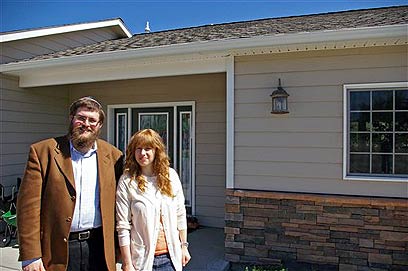_a.jpg)
Big Sky country gets a mikvah
Chabad emissaries in Montana, one of the least Jewish states in US, build ritual bath that will serve a vast area that includes Idaho, North Dakota and South Dakota
In one of the least Jewish states in the country, a traditional Jewish group working to revive religious observance has built a mikvah, a ritual bath for spiritual purification.
The bath opened several months ago in an extension built on the Bozeman home of Rabbi Chaim Bruk and his wife, Chavie, who came here with the hasidic movement Chabad Lubavitch.
Chabad sends couples around the world, including to remote spots with tiny Jewish populations, to cook kosher dinners for travelers, teach rituals such as lighting Shabbat candles and lead classes on Judaism.
As a result of the Bruks' work, Montana now has what Chabad says is the only contemporary mikvah in a vast area that includes Idaho, North Dakota and South Dakota. The Bruks expect to draw Jews from outside the state, including tourists.
It's "a milestone for Jewish life in Montana," Rabbi Bruk said.
Jewish law requires married women to immerse in the mikvah for ritual purity after menstruation and a period of abstaining from sex. Brides are expected to immerse before their weddings. The bath can also be used as purification as part of converting to Judaism.
Outside of the small Orthodox Jewish community, many American Jews had stopped using the mikvah, partly out of objections to its perspective on women. However, in recent years, more Jews have been rediscovering traditional practices, and the ritual bath has had a renaissance.

Rabbi Chaim Bruk and his wife, Chavie (Photo: AP)
Center of Jewish life
The American Jewish Year Book, which tracks the Jewish population, estimated that as of 2007, 850 of Montana's nearly 945,000 residents were Jewish.
However, Bruk believes there are about 2,500 Jewish households in the state, plus hundreds of Jewish college students. That's based on personal visits, Internet contacts, mailing lists and research including rabbinical students' trips to far-flung parts of the state, Bruk said.
For years, Bozeman has had a congregation affiliated with the liberal Reform Jewish movement, which met in various places around town until 2001, when it moved into a permanent home. Still, most Jews who move to Montana "are not looking to find a center of Jewish life," Bruk said. He and his wife aim to provide that service.
They teach Torah classes, established a kosher meal service and can tell you where to shop for kosher food and wine in the Bozeman area. Information is shared through the website http://www.JewishMontana.com, which includes Chavie Bruk's invitation for Jewish women to contact her about why, how and when the mikvah is used. The site also features pictures of her husband lighting a menorah at the state Capitol with Roman Catholic Gov. Brian Schweitzer.
Warm and welcoming
The Bozeman suite includes a jetted bathtub and a shower, both of which a woman uses before entering the mikvah, which is tiled in shades of brown and could pass for an elegant bath in a multimillion-dollar home at Big Sky, the swank resort area between Bozeman and Yellowstone National Park. High-quality soap and shampoo, plush robes and thick towels are provided.
"You give women their own space where they can connect with God," said Rabbi Bruk, who grew up in the New York borough of Brooklyn, and came to Bozeman in early 2007 newly wedded to Chavie, who grew up in San Antonio, Texas. Fundraising for the mikvah, built at a cost of more than $250,000, began a year later.
Judaism allows the ritual to be practiced in "living" natural waters, such as some of Montana's streams, but Bruk said the cold winters here are one reason that is impractical.
"You want it to be warm and welcoming, and that comes with having an indoor mikvah," he said. But "you can't just build a tub and fill it up and heat it and you've got yourself a mikvah."
The bath is next to the Bruk home's garage-turned-synagogue where, according to the rabbi, Shabbat services on Fridays draw about 30 people and religious holidays about 100.










